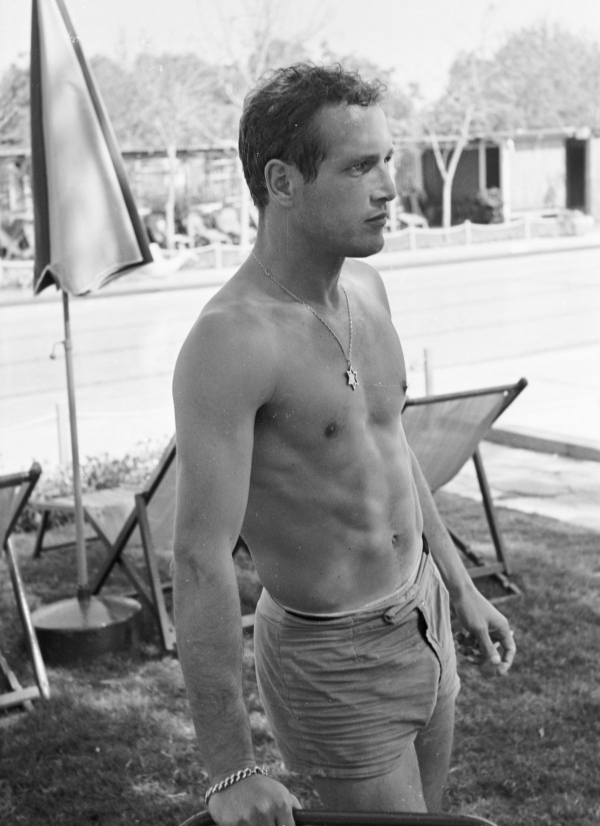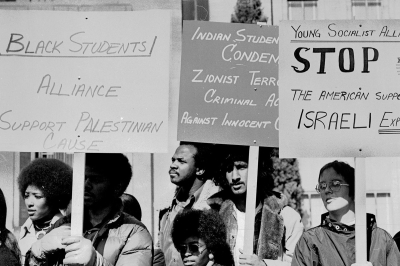When I was 12 or 13, I found a copy of Leon Uris’s 1958 novel Exodus in my synagogue’s library. I stood amid the shelves, surreptitiously reading a sex scene (did the book just fall open right to it, the way every copy of Judy Blume’s Forever did at Chapter 12?) in which the passionate, long-legged, redheaded Jordana Ben Canaan makes love to her cerebral military strategist boyfriend, David Ben Ami, in the ruins of a Crusader castle on Mount Tabor in 1947 Palestine. As they canoodle, they recite King Solomon’s Song of Songs to each other. Uris uses ellipses ecstatically. (“And he kissed her breast … ‘Thy two breasts are like two young roes that are twins, which feed among the lilies …’ And he kissed her lips … ‘And the roof of thy mouth like the best wine for my beloved, that goeth down sweetly’ …”) I was scandalized.
I took the book home and devoured it, much the way David devoured Jordana.
Exodus not only titillated me but also filled me with youthful pride. It’s difficult to overstate what a phenomenon the novel — a sweeping story about the founding of the modern state of Israel — was, even in the early ’80s, when it was already more than two decades old. It was over 600 pages long, structured in “five books” (you know, like the Hebrew Bible), touching on the exile of Jews from the Holy Land, the terrors of life in the Pale of Settlement in Russia and Eastern Europe, and the horrors of the Holocaust. Mostly, though, it focused on a handful of Jewish characters, plus one foxy blond Presbyterian American nurse, in 1947 and 1948.
If you walked into a Jewish living room when I was a kid (or today, if you have a grandparent of a certain age), you’d spot it on a shelf. The hardcover edition dominated bestseller lists for months; it was translated into over 50 languages. When the paperback came out in September 1959, it had the largest advance purchase order — a million and a half copies — of any novel in publishing history. It presaged a glut of massive, sweeping national epics by the likes of James Michener, John Jakes, and James Clavell. And in 1960, it became a blockbuster movie starring Paul Newman as hottie Jewish freedom fighter Ari Ben Canaan.
From the start, Exodus hugely influenced the world’s perception of Israel. “It’s been said that the only other book that had as great an impact on American foreign policy was Pearl Buck’s novel about China,” said Riv-Ellen Prell, professor of American studies at the University of Minnesota and author of Fighting to Become Americans: Jews, Gender, and the Anxiety of Assimilation. “The book wasn’t just a driver of Jewish identity. People in the notoriously antisemitic state department read it at every level.”
In Our Exodus: Leon Uris and the Americanization of Israel’s Founding Story, Israeli college professor and historian M.M. Silver notes that the book was a gift to Israel’s tourist industry. “More tourists fly into Tel Aviv with Exodus than with the Bible,” said the director of the Israeli government’s tourist office in 1959. David Ben-Gurion, the country’s first prime minister, reportedly proclaimed, “I don’t usually read novels. But I read that one. As a literary work, it isn’t much. But as a piece of propaganda, it’s the greatest thing ever written about Israel.” Production images from the Otto Preminger film, featuring a shirtless Paul Newman wearing a Star of David necklace, only increased the story’s allure.
The book seemed to fit right in with the vision of Israel my parents provided for me. I grew up listening to Israeli folk records and hearing about the kibbutz movement, in which no one owned property and everyone tilled the land together and worked to make the desert bloom. I was taken to the Sinai desert, where my family camped with Bedouins and looked at the stars; I saw the mountain in the Galilee that would later feature in my bat mitzvah haftarah, where the prophet Deborah led the Israelites into battle against the Canaanites. Israel seemed like the happy almost-ending to the story of Jewish history. There’s a joke that the meaning of every Jewish holiday is “They tried to kill us, we won, let’s eat.” Jaffa oranges and creamy feta seemed like our delicious due for surviving the Holocaust.
When my parents were growing up, Jewish American identity was in transition. The Holocaust was a shattering collective experience, not only because of the deaths of 6 million Jews but also because it reminded American Jews that they were only guests in their own country. They knew about the draconian immigration quotas in America and elsewhere. No one wanted refugee Jews. Then, suddenly, the newly established state of Israel provided what seemed like a true haven.
The postwar period was also when American Jews were starting to join the middle class in greater numbers, leaving tight urban enclaves and beginning a big collective move to the suburbs. It was a weird time. As Silver writes, “By the end of the 1950s, suburban Jews developed a new, vicarious form of affiliation; because Jewishness seemed inauthentic in suburban space, they sought membership in a far-off land whose moral credibility was rooted in a sacred Jewish past.”
Exodus, the novel, arrived when Jews were searching for a new self-image. Uris was committed to a vision of muscular, heroic Jews, not ghetto weaklings or “golden riders of the psychoanalytic couch” (Silver’s term for Jewish American intellectual novelists like Philip Roth, who Uris loathed — and the feeling was evidently mutual). As Prell put it, “Exodus was a work of popular fiction that established a deep sense of Jewish identity, [instead of one] that had been far more complicated, fragmented, filled with shame. This book made the case that that’s not who you are as a Jew.”
As I got older, though, my youthful love of the book started to feel like an embarrassing crush on an teen idol. When I thought about Exodus at all, I recalled it as wildly sexist and reductive. More importantly, I wanted to forge my own sense of Jewish American selfhood that didn’t rely on endless stories of Israeli heroism and Holocaust horror, the twin narratives that seemed to direct so much of Jewish education and identity formation. Later, the Israeli government moved increasingly rightward and Jewish settlements expanded incrementally in East Jerusalem, Gaza, and the West Bank, and I turned away from Israel as a source of Jewish identity entirely.
I instead focused my attention on Jewish art, Jewish folklore and mythology, Jewish food, home-based rituals like lighting Shabbat candles and building a sukkah and hosting Passover seders. I chose to ponder Jewish values and history through culture, through learning about Jewish leadership in American labor and feminist movements. When I had kids, I addressed Israel the way many Gen X and older millennial parents have: by avoiding it. By sighing when the subject came up, saying “It’s complicated,” and passing the latkes.
I no longer have the luxury of noping out. I need to address my ambivalence and confront the gaps in my education if I’m to talk responsibly about Israel and Palestine, including the current siege of Gaza, with my own kids, who’ve grown up in silence. (I choose the word advisedly: Breaking the Silence is an Israeli NGO established by Israel Defense Forces veterans to talk about their experiences in the Occupied Territories since 2000.) My failure to discuss Israel with my children, even if I don’t have answers, is my fault. The first time I publicly wrestled with the subject of talking to kids about Israel when you’re dismayed by Israel, I got an email from a reader who wrote, “Jews like you are how my family ended up in the ovens.” Now I think if you’re not being accused of being a self-hating Jew by some folks and a Zionist stooge by others, you’re doing something wrong.
As part of my self-education, I decided to reread Exodus and watch the movie, which I’d never seen. (Spoiler alert: This is one of those rare cases in which the movie is better than the book. Which is damning with faint praise.)
:no_upscale()/cdn.vox-cdn.com/uploads/chorus_asset/file/25212103/MMDEXOD_EC002.jpg)
:no_upscale()/cdn.vox-cdn.com/uploads/chorus_asset/file/25212130/MMDEXOD_EC003.jpg)
Exodus is a novel, but the foreword begins, “Most of the events in Exodus are a matter of history and public record.” The rest of the book’s 608 (!) pages are filled with a litany of historical names and real places. There’s no afterword offering clarification; I had to keep looking up what was factual and what Uris had invented. The Jewish characters are wholly noble, though their politics differ, with some swearing by diplomacy and others by violent freedom-fighting. The Arabs — both Christian and Muslim — are evil cartoons. Uris luxuriates in phrases like “so illiterate and so backward,” “blood orgy,” “slithering along the ground with knives between their teeth,” “nearly insane with rage,” and “the dregs of humanity.” He makes sweeping generalizations like “There was little song or laughter or joy in Arab life. It was a constant struggle to survive. In this atmosphere, cunning, treachery, murder, feuds, and jealousies became a way of life.”
The book proffers only two good Arabs. One is Kammal, the village leader who says, “The Jews are the only salvation for the Arab people. The Jews are the only ones in a thousand years who have brought light to this part of the world.” (When Kammal’s weak-willed son Taha takes over as mukhtar, he spends his time obsessing over having forbidden sex with Jordana and preparing to betray her brother Ari.) The other good Arab is Mussa, the Druze who saves Ari’s life when he’s shot by British soldiers after breaking his uncle out of jail. Mussa is essentially faceless, but has a “carriage of dignity” and a village that’s “sparkling white and clean in comparison to the filth and decay of most Arab villages.” How nice.
Exodus’s Jews just want to live in peace. The only time they do something bad, it’s “a strange and inexplicable sequence of events” — a mysterious accident! In a short passage based on the real-life 1948 Deir Yassin massacre, in which Zionist paramilitary groups attacked a village of mostly women and children, Uris says, “a panic broke out among Maccabee troops and they opened up a wild and unnecessary firing.” Strange! Inexplicable! His problem with the massacre isn’t the dead innocents; it’s that it “fixed a stigma on the young nation that it would take decades to erase.”
The 1948 narrative I and so many others grew up with, the one depicted in Exodus, maintains that Arab leaders, both in Palestine and in the wider world, told residents to flee while Jews begged them to stay. We now know this isn’t true. Left-leaning Israeli media have reported on the Israeli government’s ever-increasing efforts to suppress scholarship on 1948-era Palestine and its history, including the fact that Zionists attacked Arab residents and seized their land. Palestinians are more than justified in calling their own Exodus the Nakba — the Catastrophe.
The argument that Uris and the modern Jewish right share, that non-Jewish Palestinians chose to leave, isn’t correct. The insistence that Israel is inherently virtuous because, after the Nakba, it did what America refused to do and accepted Jewish refugees (this time, the ones expelled from or threatened with murder in the Arab countries in which they were residing in 1948) isn’t relevant. Absorbing all those refugees meant less land — or the impossibility of return — for the Palestinians. Jews deserve a homeland, but so do Palestinians. As I sighed to my kids: It’s complicated. But I also need them to know that there are Jews working for the rights of Palestinians. Organizations like T’ruah, the New Israel Fund, and B’Tselem have long focused on peace and human rights throughout Israel and the Jewish world.
When I sat down to watch Exodus, the movie, with my home-from-college kid (who quickly fled, noting, “This is boring”), I was surprised to find it more nuanced than the book. Director Otto Preminger explicitly rejected Uris’s rabid anti-Arab prejudice. “I don’t believe that there are any real villains,” he later said. Preminger hired Uris, who had written a successful screenplay, Gunfight at the O.K. Corral, to adapt his novel into a movie but quickly wound up firing him. Preminger claimed he tried to work with Uris’s script but gave up a third of the way through; Uris claimed he never wrote a word and was fired for his beliefs. Uris said, “Otto was a terrorist — he’s Arafat, a Nazi, Saddam Hussein.” Preminger replaced him with the then-blacklisted non-Jewish screenwriter Dalton Trumbo; it was Trumbo’s first script credit since his refusal to testify before the House Un-American Activities Committee in 1947.
“I think my picture is closer to the truth, and to the historic facts, than is the book,” said Preminger. In a strangely prescient snippet of dialogue not in the book, Ari objects to his uncle Akiva’s attacks on unsanctioned targets: “I think these bombings and these killings hurt us with the United Nations,” he says. “A year ago, we had the respect of the whole world. Now, when they read about us, it’s nothing but terror and violence.”
Preminger’s claim that his film “avoids propaganda” is debatable, though. It still features a rousing speech from a Jerusalem balcony, in which Ari’s father Barak, a diplomatic Jewish leader played by Lee J. Cobb, tells a vast cheering crowd that the United Nations has voted to partition the land into two states and urges, “To the Arab population of Jewish Palestine, we make the following appeal: The Grand Mufti has asked you either to annihilate the Jewish population or to abandon your homes and your lands and to seek the weary path of exile. We implore you, remain in your homes and in your shops! And we shall work together as equals in the free state of Israel!” In reality, not so much.
:no_upscale()/cdn.vox-cdn.com/uploads/chorus_asset/file/25211954/GettyImages_1077131528.jpg)
My kid is right: The movie isn’t great. It is three and a half hours long. (Comedian Mort Sahl supposedly stood up three hours into a screening and yelled, “Otto! Let my people go!”) Paul Newman is wooden. Preminger’s wife Hope Bryce told the director’s biographer that Newman and Preminger got off on the wrong foot when the actor arrived with five pages of notes and suggestions about his character and Preminger immediately informed him he wasn’t changing a word of Trumbo’s script. When filming began and Newman asked what Ari should be thinking in a certain scene while eavesdropping on two other characters, Preminger barked, “Oh for God’s sake, just stand there.”
But as Ari Ben Canaan, Newman is at his most ravishing. Who cares about wooden acting when a human looks like that? Seeing this huge movie star (half-Jewish, as both Adam Sandler and my mother note) wearing a Star of David on his wet, bare, heaving chest — in his first scene, he’s just swum to shore in a heroic and strenuous reconnaissance mission, obviously — at a time when Jews were mostly depicted onscreen in sword-and-sandal epics and generally played by the goyish and unpleasant Charlton Heston is surreal. Newman embodies exactly what Uris wanted from his Ari: an icy blue-eyed action hero, not a cringing shtetl weakling.
Sal Mineo — who also has a shirtless scene — gives an excellent performance as an angry young Holocaust survivor and Nazi rape victim. (Again, this is not in the book. Only Jewish women get raped in the book.) Mineo is naturalistic and emotional, and his chemistry with every other actor is magnetic. The movie’s action scenes are thrilling; there are flashes of humor the book lacks; the fact that the film was shot on location lends immediacy and verisimilitude. But it’s still cheesy, and it reminds me of how far away modern-day Israel is from the naïve, glorious promise of my childhood. I wonder how many other Jews my age and older have considered the ways in which Exodus warped our perception of the country and made us slow to demand better of it.
I’d argue that it’s worthwhile for everyone to revisit books and movies they loved as kids. You too may be shocked to learn how you missed or even internalized some pretty problematic ideas. Real life is knotty and multistranded, and reductive storytelling harms us all. “Uris was a vivid and suspenseful writer,” said Prell — who, by the way, also read Exodus when she was 12 — “and a simple enough writer to tell a simple story about one of the most complicated places on earth.”
The movie changes the book’s ending, making it bleaker. Ari stands over an open grave containing two corpses wrapped in linen. A double funeral, for an Arab and a Jew. Ari says, in Trumbo’s words, “I look at these two people and I want to howl like a dog. I want to shout ‘Murder!’ so that the whole world will hear it and never forget. It’s right that these two people should lie side by side in this grave, because they will share it in peace. But the dead always share the earth in peace. And that’s not enough. … I swear, on the bodies of these two people, that the day will come when Arab and Jew will share a peaceful life in this land that they have always shared in death.” But in the final shot of the film, a line of jeeps come, and the men and women with rifles hop in, and we know there will be more killing.






